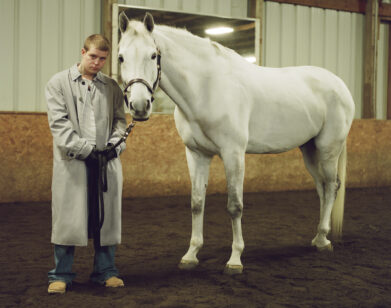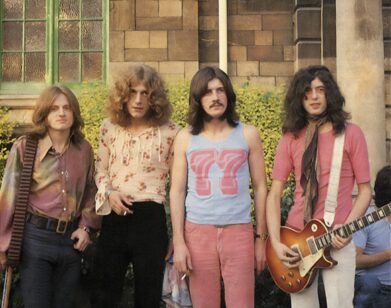Passion Pit’s Gossamer Strains

ABOVE: MICHAEL ANGELAKOS. IMAGE COURTESY OF JASON NOCITO
After releasing his debut album Manners three years ago, Passion Pit’s lead singer, Michael Angelakos, toured the world—and grew up, bit by bit, along the way. When it came time to think about a follow-up, Angelakos didn’t set a deadline for himself; he took his time (and battled some personal demons along the way). The end result is Gossamer, a beautifully produced, deeply autobiographical album that springs from his own experiences; most notably, the strength he’s drawn from his relationship with his fiancée. This record showcases both Angelakos’ pride in his work and his remarkable development since he began writing Manners—originally intended as a Valentine’s Day present for his then-girlfriend—almost four years ago. Its debut single, the deceptively bright “Take a Walk,” tracks the modern-day American dream, and its devolution, through a narrative culled from Angelakos’ own family, and is perfectly representative of the personal nature of Gossamer.
We spoke with Michael Angelakos about battling depression, moving beyond chaos, and making a therapeutic record.
ILANA KAPLAN: It’s been a while since your debut album, Manners, came out. What’s changed in-between that album and Gossamer?
MICHAEL ANGELAKOS: I was 21 when I was making Manners. I’m about to turn 25, so that’s an exponential leap. A lot of things happened during those post-college years, I suppose. I guess the biggest thing that happened was, I had a record that had done pretty well and there were a lot of expectations on my part for the next record. I really wanted to do something great. Of course, a lot of real-life events were happening. I got engaged. It was just kind of a huge blur between the two records. It’s hard to really stack up everything and look at it. While I was shifting and trying to become this adult, without really having a chance to become an adult because I had been on the road and I hadn’t been able to settle down—as soon as I had gotten to that point, all of these crazy, very personal things started happening. It was the most chaotic, record-making process, I think. I just can’t make a record like this ever again.
KAPLAN: What were some of the struggles you dealt with?
ANGELAKOS: Well, I had been dealing with issues since I turned 16; depression issues. It’s hard when you go in and out of different modes of life. When you’re on tour and then you have time off, it’s ultimately… it’s a shape-shifting thing. It was really hard for me to grasp who I was, let alone what music I was making and what I was representing. It was a very difficult period. Ultimately, I’m okay now. I’m still engaged. I plan to be married eventually, when I have time. The record is coming out, so I’m pleased with the end results.
KAPLAN: I’m glad to hear it. What is the biggest musical difference when listening to Manners in comparison to Gossamer? I feel like Gossamer is a lot more chilled out.
ANGELAKOS: I wouldn’t say it’s “chilled out.” Maybe it’s less intense from start to finish, in terms of the way it’s sequenced. I think it’s just a smarter record, in terms of how it’s put together. The gestation period for this record is much longer. I had time to think about how I wanted it to sound. I wasn’t just thrown in and given a deadline. I was just told, “Whenever you’re ready.” Given that space and that legroom, I was able to write songs that I can now sit down and say I stand by. With Manners, I don’t necessarily stand by it. I think it’s a really awesome accomplishment for the period of time that I was given and the state I was in when I was making it, but this record has a lot more textures to it. You can hear all of the different sounds, as opposed to the sounds that are coagulating and are making this weird wall of sound in Manners. I just think the mix to the lyrical standpoint, it’s a lot more confident—happy and cathartic. I’m happy I put out something that wasn’t so self-conscious. I’m finally very proud of something I’ve done. I’m terrified as well, but I am confident.
KAPLAN: Gossamer is an interesting title for an album. What’s the story behind it?
ANGELAKOS: Honestly, like most things, I was making coffee, and I like to use working titles. Nothing can go untitled. I hate that. So, I just named it Gossamer. I don’t know. I think I just saw a spider in my house. That was about it. It became its own thing. Later on, it became something more applicable. I tried to go with a thousand different titles, but ultimately, Gossamer just stuck. I didn’t mean the pun.
KAPLAN: Does each song have its own story on Gossamer, or does one story resonate throughout?
ANGELAKOS: I equate it to a number of different chapters that overlap each other in certain parts, but each one kind of sits in its own world lyrically and sometimes sonically. They all have a distinct voice and style. Together, they felt like a pretty cohesive piece of art. First of all, it’s not a concept album. There isn’t really a “story” behind it. It’s mostly about myself and figuring out what the fuck was going on with my head. This album was more about a relationship under the strains of a person going through hell, making a record, and that relationship. You know? That relationship was total warfare. I was going through things and that made the record harder to make. The record was my life. It was hard to figure out what was happening. Ultimately, this wonderful person in my life was being aggressive and was really only there to keep me safe and make sure that everything was going alright for me and not to her. The whole record is dedicated to her in that sense. She was such an incredible figure and beyond the fact that I love her, I look up to her. She’s one of these humans that deserves to be written about in a really wonderful way. I just hope that I did that and her justice. It’s not a “happy” record, but it was good therapy in my life.
KAPLAN: Your first single, “Talk A Walk,” throws together a lot of different scenarios. Is this particularly autobiographical?
ANGELAKOS: That’s the only song that’s kind of indirectly about my life. It’s almost not about my relationship overall. It’s about figures in my family and how they dealt with economic hardship and family life combined. It’s about these typical breadwinners that came over from Greece, and then it ends with someone more contemporary having totally destroyed a family. It’s all true. It’s all stuff that’s actually happened in my family. It’s not my voice personally: it’s theirs. It’s all actually word for word what happened, save for the dramatic, theatrical ending. I kind of imagine what it was like for this figure to tell his wife that he had stolen money. It was the most interesting and heartbreaking part for me. I just watched my family dealing with the economic crisis. It’s totally not political in any way. I’m not trying to make any statement on it. It was mostly about my family. After it all happened, it made me look at the way my relationship worked and the way a lot of relationships work today. It grossed me out. The whole thing made me really sick. One thing we all had in common was my family would always take walks. That’s it. It’s pretty simple.
PASSION PIT’S SECOND ALBUM, GOSSAMER, IS OUT TOMORROW. FOR MORE ON THE BAND, VISIT THEIR WEBSITE.






